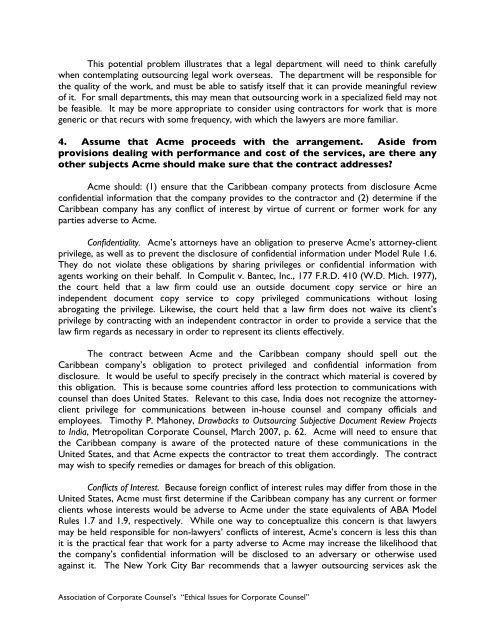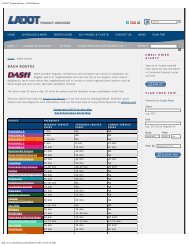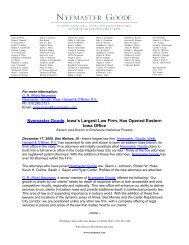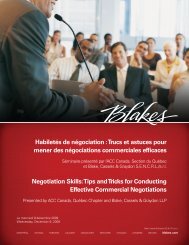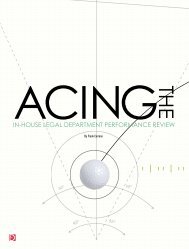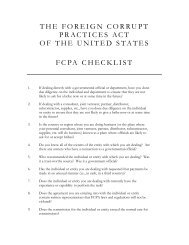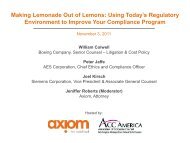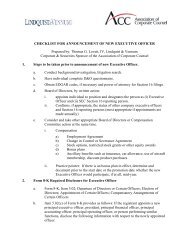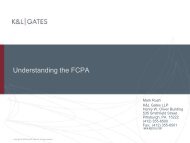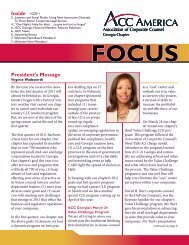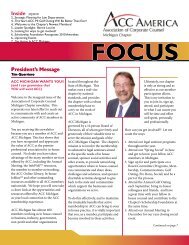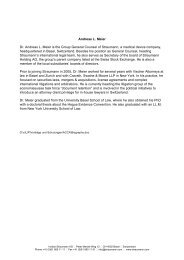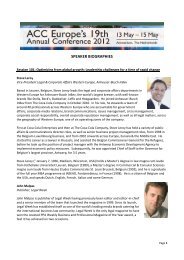in the family? - Association of Corporate Counsel
in the family? - Association of Corporate Counsel
in the family? - Association of Corporate Counsel
Create successful ePaper yourself
Turn your PDF publications into a flip-book with our unique Google optimized e-Paper software.
This potential problem illustrates that a legal department will need to th<strong>in</strong>k carefully<br />
when contemplat<strong>in</strong>g outsourc<strong>in</strong>g legal work overseas. The department will be responsible for<br />
<strong>the</strong> quality <strong>of</strong> <strong>the</strong> work, and must be able to satisfy itself that it can provide mean<strong>in</strong>gful review<br />
<strong>of</strong> it. For small departments, this may mean that outsourc<strong>in</strong>g work <strong>in</strong> a specialized field may not<br />
be feasible. It may be more appropriate to consider us<strong>in</strong>g contractors for work that is more<br />
generic or that recurs with some frequency, with which <strong>the</strong> lawyers are more familiar.<br />
4. Assume that Acme proceeds with <strong>the</strong> arrangement. Aside from<br />
provisions deal<strong>in</strong>g with performance and cost <strong>of</strong> <strong>the</strong> services, are <strong>the</strong>re any<br />
o<strong>the</strong>r subjects Acme should make sure that <strong>the</strong> contract addresses?<br />
Acme should: (1) ensure that <strong>the</strong> Caribbean company protects from disclosure Acme<br />
confidential <strong>in</strong>formation that <strong>the</strong> company provides to <strong>the</strong> contractor and (2) determ<strong>in</strong>e if <strong>the</strong><br />
Caribbean company has any conflict <strong>of</strong> <strong>in</strong>terest by virtue <strong>of</strong> current or former work for any<br />
parties adverse to Acme.<br />
Confidentiality. Acme’s attorneys have an obligation to preserve Acme’s attorney-client<br />
privilege, as well as to prevent <strong>the</strong> disclosure <strong>of</strong> confidential <strong>in</strong>formation under Model Rule 1.6.<br />
They do not violate <strong>the</strong>se obligations by shar<strong>in</strong>g privileges or confidential <strong>in</strong>formation with<br />
agents work<strong>in</strong>g on <strong>the</strong>ir behalf. In Compulit v. Bantec, Inc., 177 F.R.D. 410 (W.D. Mich. 1977),<br />
<strong>the</strong> court held that a law firm could use an outside document copy service or hire an<br />
<strong>in</strong>dependent document copy service to copy privileged communications without los<strong>in</strong>g<br />
abrogat<strong>in</strong>g <strong>the</strong> privilege. Likewise, <strong>the</strong> court held that a law firm does not waive its client’s<br />
privilege by contract<strong>in</strong>g with an <strong>in</strong>dependent contractor <strong>in</strong> order to provide a service that <strong>the</strong><br />
law firm regards as necessary <strong>in</strong> order to represent its clients effectively.<br />
The contract between Acme and <strong>the</strong> Caribbean company should spell out <strong>the</strong><br />
Caribbean company’s obligation to protect privileged and confidential <strong>in</strong>formation from<br />
disclosure. It would be useful to specify precisely <strong>in</strong> <strong>the</strong> contract which material is covered by<br />
this obligation. This is because some countries afford less protection to communications with<br />
counsel than does United States. Relevant to this case, India does not recognize <strong>the</strong> attorneyclient<br />
privilege for communications between <strong>in</strong>-house counsel and company <strong>of</strong>ficials and<br />
employees. Timothy P. Mahoney, Drawbacks to Outsourc<strong>in</strong>g Subjective Document Review Projects<br />
to India, Metropolitan <strong>Corporate</strong> <strong>Counsel</strong>, March 2007, p. 62. Acme will need to ensure that<br />
<strong>the</strong> Caribbean company is aware <strong>of</strong> <strong>the</strong> protected nature <strong>of</strong> <strong>the</strong>se communications <strong>in</strong> <strong>the</strong><br />
United States, and that Acme expects <strong>the</strong> contractor to treat <strong>the</strong>m accord<strong>in</strong>gly. The contract<br />
may wish to specify remedies or damages for breach <strong>of</strong> this obligation.<br />
Conflicts <strong>of</strong> Interest. Because foreign conflict <strong>of</strong> <strong>in</strong>terest rules may differ from those <strong>in</strong> <strong>the</strong><br />
United States, Acme must first determ<strong>in</strong>e if <strong>the</strong> Caribbean company has any current or former<br />
clients whose <strong>in</strong>terests would be adverse to Acme under <strong>the</strong> state equivalents <strong>of</strong> ABA Model<br />
Rules 1.7 and 1.9, respectively. While one way to conceptualize this concern is that lawyers<br />
may be held responsible for non-lawyers’ conflicts <strong>of</strong> <strong>in</strong>terest, Acme’s concern is less this than<br />
it is <strong>the</strong> practical fear that work for a party adverse to Acme may <strong>in</strong>crease <strong>the</strong> likelihood that<br />
<strong>the</strong> company’s confidential <strong>in</strong>formation will be disclosed to an adversary or o<strong>the</strong>rwise used<br />
aga<strong>in</strong>st it. The New York City Bar recommends that a lawyer outsourc<strong>in</strong>g services ask <strong>the</strong><br />
<strong>Association</strong> <strong>of</strong> <strong>Corporate</strong> <strong>Counsel</strong>’s “Ethical Issues for <strong>Corporate</strong> <strong>Counsel</strong>”


